Suzanne Lazaroo
11 June 2024: From University of Canberra students exploring how Artificial Intelligence (AI) can make home care services more empowering, to creating a management system for a social enterprise for women from migrant and refugee backgrounds, the recent Capstone Project Expo highlighted how technology and systems can be effective catalysts for social impact.
The Expo is the culmination of the Capstone unit, which sees undergrad and postgrad students at the School of Information Technology and Systems (ITS) – part of UC’s Faculty of Science and Technology – dedicate a whole semester to one project, which reflects real world problems and challenges.
Each project is sponsored by an industry partner or University academic; at the end of each semester, the top projects are spotlighted at the Expo, held this year at the Ann Harding Centre.

“The Capstone Project Expo is one of the biggest ITS events showcasing the skills of our excellent students and celebrating their achievements,” said Assistant Professor Richa Awasthy, one of the Capstone unit convenors.
“It brings our students together with academics and industry practitioners within the ACT region and beyond, providing networking opportunities and leading to future collaborations – creating an environment aligned with UC's spirit of Galambany, within which all work together to turn their ideas into impactful reality.”
She added that the Capstone unit was a valuable early testing ground and incubator for new ideas, in which students can demonstrate their capacity for developing something valuable.
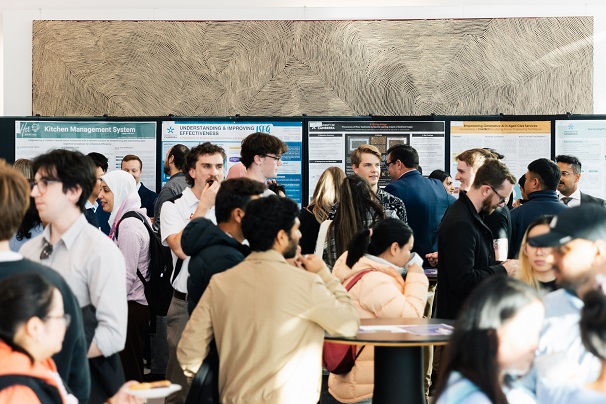
This year, students presented on a wide range of topics and applications, including EmoSense, an emotion-recognition app that analyses brainwaves; the applications of virtual and mixed reality in mental health care and rehab; and understanding and improving the effectiveness of ISEQ, the student experience questionnaire.
The opportunity to work for and with industry partners is one of the Capstone unit’s biggest draws. This enables students to formulate and test innovative solutions to real world problems; work with and learn from industry, and inform industry processes; and build valuable interpersonal and communication skills.
“The students have demonstrated teamwork, managed projects, and responded to changing customer requirements to deliver expected project outcomes. Within this unit, we see them being transformed into professionals ready for the workforce, through their engagement with industry practitioners and academics,” Assistant Professor Awasthy said.
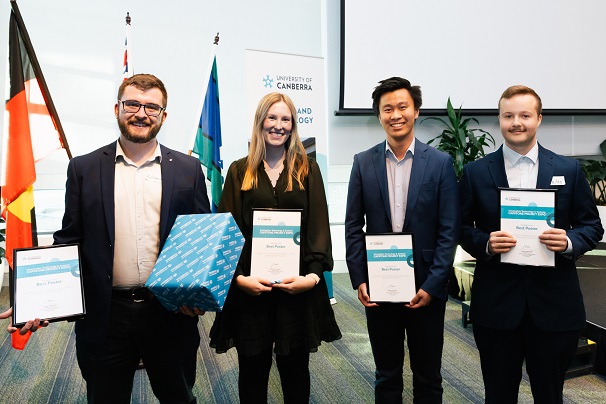
This year’s Expo saw William Friend, Kate Hanbury, Dannyra Heng and Jack Kitto take top spot in the Best Poster category. The team also scored the People’s Choice Award, which was sponsored by Microsoft. Presented for the first time this year, the latter was based on a real-time audience vote.
The group created a kitchen management system to improve operations for Her Kitchen Table (HKT), a social enterprise offering home-cooked meals from women from migrant and refugee backgrounds in Canberra. The project was sponsored by Nazia Ahmed from The Social Outcomes Lab, parent company for HKT.
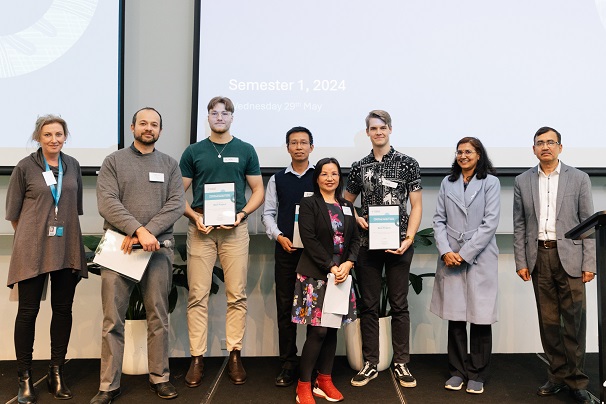
The best project category was won by Chris McCourt, Quang Pham, Adrielle Delos Santos and Oliver Witrzens, whose project was titled “A grainy image: provenancing of river sediments by machine learning analysis of sediment images”. This project was sponsored by Associate Professor Jurian Hoogerwerf and Dr Girija Chetty, the School of ITS and the ACT Government.

Taking out the Best Presentation category for their work on empowering generative AI in home care services were Jyotsna Gaur, ABS Hasan, Huynh Nguyen and Somya Shukla, their project sponsored by Adjunct Professor Tony Kwan and Hope Holistic Care.
“Our focus was to build an AI-driven chatbot to help staff in home care services to address queries quickly and effectively, and we were keen to develop a multilingual model as well,” Ms Gaur said, in her presentation.
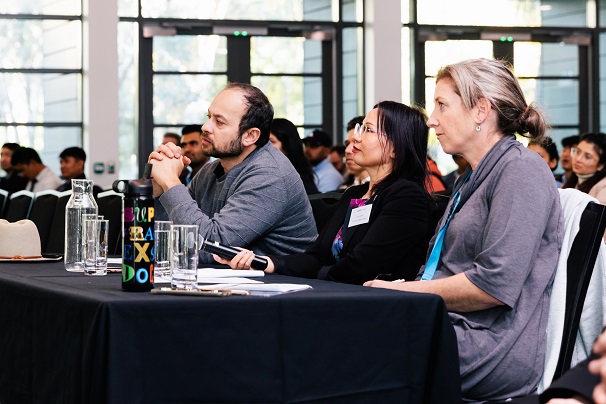
The judging panel comprised of Jenalle Bushby (Australian Computer Society, ACS), Yvonne Soper (Careers UC) and Dr Carlos Noschang Kuhn (Research Chair in Open Source Technologies at the University).
“The ACS is very much about providing support to students, and this event is always a great opportunity to do so,” said Ms Bushby, who also encouraged University of Canberra students to take advantage of the 12-month complimentary membership provided by the ACS as part of the organisation’s Professional Partnership Program with the University of Canberra.
“It was a privilege to evaluate the students' work and witness their innovative ideas with support from their professors and industry mentors. We’ve seen how much hard work has obviously gone into every team project, and the teamwork they have displayed is very valuable,” she said.
Ms Bushby cited the communications skills demonstrated by the student groups as particularly important, allowing them to bridge the knowledge gap with stakeholders who didn’t come from an IT background.
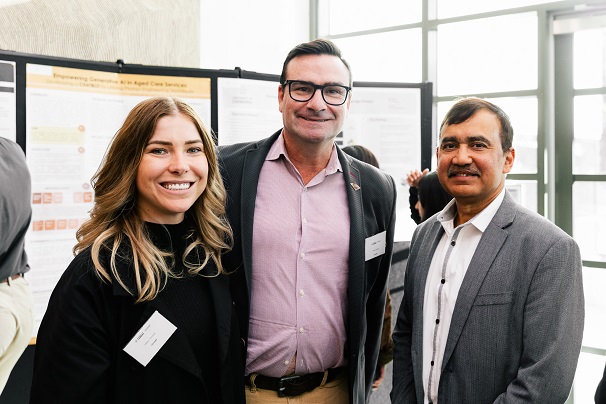
Project sponsor Drew Horsell, Founder and Managing Director of Horsell, agreed – and commented that the fresh ideas and diversity in the room at the Expo were particularly heartening.
“In the approach to using technology to solve the problems and challenges of society, we truly need the kind of inquisitive minds and rich diversity that I see in this room,” he said, addressing the student groups.
“Please continue to ask questions, challenge the status quo, and make old guys like me think differently!”


